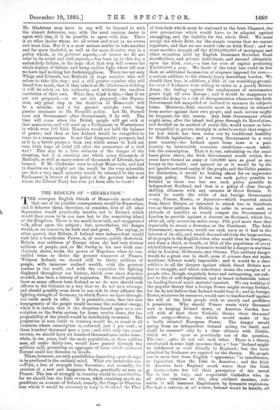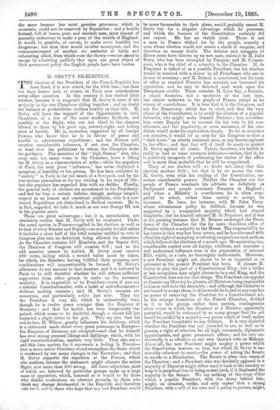THE RESULTS OF " SEPARATION."
1[1HE strongest English friends of Home-rule must admit that one of its possible consequences would be Separation, and it behoves them, therefore, to consider, first of all, what Separation would practically involve, not to Ireland, which would then cease to be our care, but to the remaining island of the Kingdom. There is too much loose talk, and exaggerated talk, afloat upon the subject ; but, nevertheless, the danger would, as we conceive, be both real and great. The saying, so often quoted, that Britain, if Ireland were independent, would sink into a fourth-rate Power, is, of course, purely rhetorical. Britain was arbitress of Europe when she had only sixteen millions of people, and, as Mr. Seeley in his new book con- clusively shows, broke the power of Napoleon when he con- trolled twice or thrice the present resources of France. Without Ireland, we should still be thirty millions of people, with immense realised wealth, with the greatest marine in the world, and with the capacities for fighting displayed throughout our history, which ever since America seceded, has been a history of expansion. We should probably draw as many officers from Ireland as we do now, should seek officers in the Colonies in a way that we do not now attempt, and should possibly even draw to our side in close alliance the fighting strength of Germany, to which Power we have through- out earth much to offer.- It is probable, even, that the new homogeneity of the people would increase the national energy, while it is certain that if the situation forced upon us a con- scription on the Swiss system for home service alone, the im- pregnability of the island would be indefinitely increased. The proportion of men liable to training would be, as usual in all countries where conscription is_enforced, just 1 per cent., or three hundred thousand men a year ; and with only two years' service, we should have six hundred thousand men under arms ; while, in ten years, half the male population, or three million men, all under thirty-two, would have passed through the military mill, presenting an aggregate of force which coalesced Europe could not threaten to invade.
These, however, are only possibilities depending upon changes to be produced in the national mind. What are certainties are. —First, a loss of strength from Secession ; and secondly, the creation of a new and dangerous State, practically as near as France. The loss of strength in taxation would be considerable, for we should lose the Irish revenue, while retaining much ex- penditure on account of Ireland, namely, the Corps of Observa- tion which it would be necessary to keep in Scotland, the Fleet
of ironclads which must be stationed in the Irish Channel, the new precautions which would have to be adopted against smuggling, and the liability for the whole Debt. We must accept the whole Debt, for the simple reasons that we cannot repudiate, and that no one would take an Irish Bond ; and we must sacrifice straight off the £100,000,000 of mortgages and other securities held by English Insurance Societies, Bank shareholders, and private individuals, and secured ultimately upon the Irish rent,—a loss for ever of capital producing £4,000,000 a year. We doubt if the total loss could be less than an additional Income-tax of sixpence imposed for ever,— a serious addition to the already heavy hereditary burden. We should then lose, in addition, a fifth of our recruiting-ground, for even if Irishmen were willing to enlist in a purely British Army, the feeling against the employment of mercenaries grows high all over Europe ; and it would be dangerous to expose the Army to a risk of disorganisation whenever the Irish Government felt compelled or inclined to summon its subjects home. Moreover, Irish recruits must in decency be released from service against their own people, and such service might be frequent, for this reason. Any Irish Government which might arise, after the island had gone through its Revolution, and decided on its method of social life, would sooner or later be compelled to govern strongly in order to restore that reaped for law which has been eaten out by traditional hostility to British legislation ; and a strong Government in a very poor country—for Ireland apart from laws is a poor country by irreversible economic conditions—must estab- lish the conscription. That is to say, calculating on the usual bases given above, the Irish Government would within five years have formed an army of 150,000 men as good as any troops in the world ; and spurred on as it would be by the not ignoble national vanity of the people, and the Celtic passion for distinction, it would be looking about for an impressive foreign policy. There is but one such policy possible to Ireland, as there was but one such policy possible to independent Scotland, and that is a policy of close though shifting alliances with any enemies of Great Britain. It would be worth the while of any foreign Government —say, France, Russia, or America—which expected attack from Great Britain, or intended to attack her, to distribute two or three millions in Dublin, in order to secure such an attitude of hostility as would compel the Government of London to provide against a descent on Scotland, which lies, after all, only seventeen miles away. Pitt paid more than that repeatedly to secure a diversion on the Continent. The Irish Government, moreover, would use such navy as it had in the interest of its ally, and would demand aid from the large section, of its people in the English cities, who would then be foreigners, and from a third, or fourth, or fifth of the population of every white Colony we possess. Dynamite would be a danger in wartime alike in London, Melbourne, and Ottawa. This military danger would be a great one in itself, even if science does not make maritime defence nearly impossible ; and it would be a clear addition to all the dangers against which Great Britain now has to struggle, and which sometimes strain the energies of a people who, though singularly brave and enterprising, are sub- ject to fits of self-depreciation, and at heart industrials intent on leading lives of much material comfort. We say nothing of the popular theory that a foreign Power might occupy Ireland, for we do not believe that Ireland would bear it ; and no foreign Power, whatever its resources, would care to burden itself against the will of the Irish people with so unruly and profitless 5. possession. Why should France waste sixty thousand men in keeping Ireland down, or America burden her- self with at least three Catholic States, three thousand miles away,—States, too, which would make of her a badly situated European Power. The danger would spring from an independent Ireland acting for itself, and could be removed' only by a close alliance with Dublin, which we - upon as practically out of the question. The twa--, ...gales do not suit each other. There is a theory entertained in some high quarters that a " free " Ireland might be indifferent or even friendly to England ; but the facts admitted by Irishmen are opposed to the theory. No people can be more free from English " oppression," or interference, or legislation than the Irish in America ; and the Irish in America hate England much worse than the Irish t home,—bate her till their perception of the moral Taw is lost in fury, and respectable Catholics who, in all other relations of life, obey civilised maxims, sub- scribe to kill innocent Englishmen by dynamite explosions. For half a century, at all events, Ireland would be hostile, all
the more because her most genuine grievance, which is economic, could not be removed by Separation ; and a hostile Ireland, full of brave, poor, and esurient men, must almost of necessity endeavour to make a prey of the wealth of England. It would be possible, of course, to make overt hostility too dangerous; but then that would involve reoonquest, and the recommencement of another six centuries of futile and exhausting effort, from which—on the theory—we are about to escape by admitting publicly that upon one great object of their permanent policy the English people have been beaten.











































 Previous page
Previous page